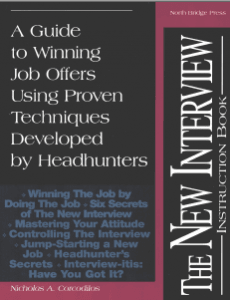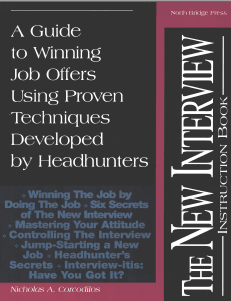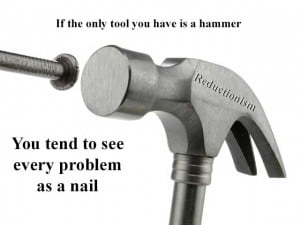In the July 7, 2015 Ask The Headhunter Newsletter, a reader gets fed up with a company president who dawdles.
Question
I just had my first — and I think best — “Nick C. ATH” interview with a start-up. I communicated only with the president — two interviews, one phone, one in person. At the end I said, “I want this job!”
All seemed well — he discussed salary (we are both on target — he spoke first about their salary intentions, I congratulate myself on this) and then… it happened. A total regression to stupid, pointless, time-wasting, moronic game-playing.
Here I am, hoping, praying to the employment gods that the offer is imminent. But it wasn’t. He said, “Well, I have one more person to interview. What I’d like to do is maybe have you come into the office to fill out an application so we can run your background check.”
Floored and disappointed (and I’m sure it showed), I struggled to remember what Nick says to say in this situation. Couldn’t remember, then calmly asked, “When do you intend to make a decision?”
“About three weeks,” he tells me. Three weeks? WTF?
Shook hands, yada yada, I went home like a stunned bunny. By the time I got there, I was feeling furious!
My take is, it’s over. He’s not going to offer, and I’ve decided I will only fill out paperwork and do the background check when I have a firm offer on the table in writing. If it’s contingent upon a drug test and references, no problem, I’m aces. But I gotta have the offer.
Later that day, I got an e-mail from a previous employer (HA!) asking me to apply for a particular position. I intend to use this to get the first employer’s best-best offer on the table, if by chance I should get a call back from him. My sister suggests I call him personally to let him know that “something suddenly came up” and that this prior employer tagged me for a job. I think she’s right.
Any insights? Thoughts about this employer’s behavior? Is he gaming me?
Nick’s Reply
No one bats an eye when an employer lays down the rules and says they’re going to talk to more candidates, or makes an offer and says you’ve got three days to make a decision about it.
Employers do this to maintain control over the hiring process, and because they control the purse strings. But, in today’s “talent shortage,” good job candidates control an important asset, too — the talent. Without good talent, employers can’t run their businesses.
Of course, no matter who is calling the shots, it’s always a risk. There are no sure things in this process. Jobs disappear, but so do great job applicants. The question is, are you always on the receiving end of ultimatums, or do you give ultimatums, too? (We discussed this once before in Why & how you should give employers an ultimatum.)
It’s time to show some control. I’d let the employer know you want the job, and that if they’d like to make an offer within five business days, you’d welcome it. (Of course, you’re still free to reject it if you don’t like the terms.) Explain that, past five days, you respectfully withdraw your application. If they ask why, tell them you’re discussing a job with one of their competitors — and remind them there’s a talent shortage.
(Caution: Do not disclose who the other employer is. It’s not hard for one disgruntled employer to nuke your offer from another.)
Who’s always in charge?
The problem for job seekers is, employers feel no pressure to make a decision. They drag out the interview process beyond what’s reasonable. Give them a friendly, reasonable deadline, and you’ll find out how serious they are. If they’re not serious, why bother getting frustrated with them?
Of course, you must decide what’s reasonable. Do you think your interviews are really sufficient for this employer to make a hiring decision? Since he’s the president of the company, it might well be. That call is yours to make. Is five days to make a hiring decision adequate, or should you ask for a decision on the spot? Again, only you know best.
Call some shots!
The point is, sometimes you should be the one calling the shots. If your gut tells you it’s a waste of time to stretch out the waiting process, then get it over with so you can pursue other opportunities with a clear mind. Waiting on a dawdling employer can be incapacitating.
Let them see that you made the decision, and that you ended the engagement. Let them go figure out what just happened. Meanwhile, there’s a good employer out there that will deal with you candidly and quickly, whether they hire you or not. Someone actually understands that talent can quickly disappear.
Learn to say “We’re done!” to indecisive employers who think they hold all the cards.
Have you ever told an employer to fish or cut bait? Do you think that’s an unreasonable position to take in some situations? Or do you think employers always hold all the cards?
: :
 The original edition of the book that launched Ask The Headhunter — The New Interview Instruction Book — is available for a limited time. Click here for more information!
The original edition of the book that launched Ask The Headhunter — The New Interview Instruction Book — is available for a limited time. Click here for more information!
This classic is available only while the limited supply lasts!
“Thanks for making The New Interview Instruction Book available. I bought a copy as soon as you announced it, it arrived quickly, and I finished it in two days. I have been following you and recommending ATH for some time. Even so, The New Interview is right now helping me as I am trying to find a new position — glad I ordered it! Also, thanks for the hand-written note on the shipping document. Nice to know that you still take that kind of personal interest. If I had ordered The New Interview Instruction Book about three days earlier, I think I may be having a different outcome on my most recent job interview.” – Chris Hogg

















